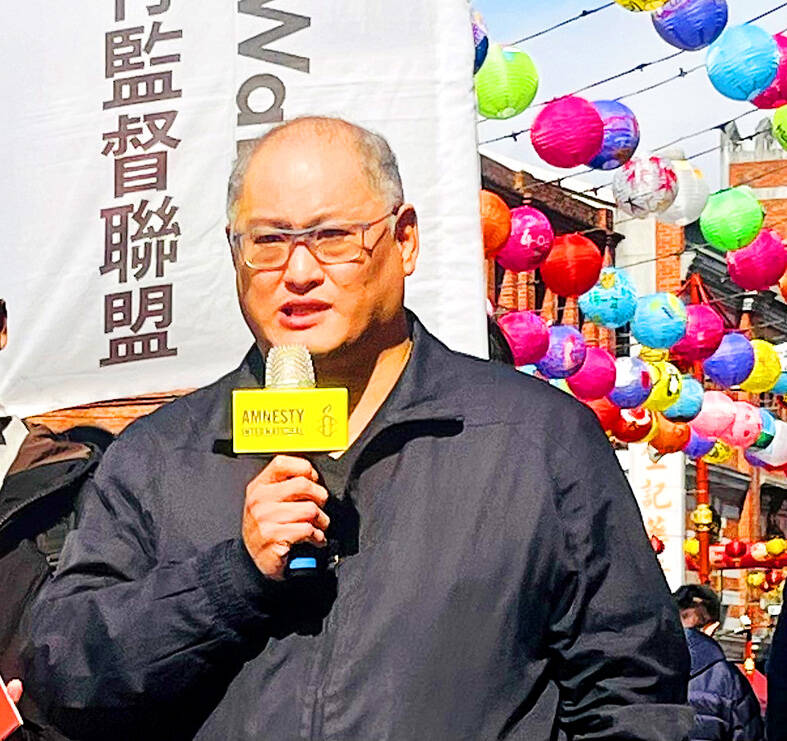Taiwanese democracy advocate Lee Ming-che (李明哲) yesterday said that the arrest in China of Gusa Press editor in chief Li Yanhe (李延賀), also known as Fucha (富察), is a sign that the Beijing government is extending its suppression of freedom of speech to the publishing industry in Taiwan.
Li returned to Shanghai last month to cancel his household registration, but was secretly arrested by police. His friends and family have not heard from him since.
He was born in China’s Liaoning Province, has a doctorate in Chinese language and literature, and was a deputy managing editor of Shanghai Literature and Art Publishing House. He later married a Taiwanese and has been living in Taiwan for several years. He established Gusa Press (八旗文化) in 2009, received a resident certificate in 2013 and has reportedly obtained Republic of China citizenship.

Photo: Chen Yu-fu, Taipei Times
Lee, who served a five-year prison sentence in China on charges of “subversion of state power,” said that Beijing’s attempt to extend its suppression of free speech to Taiwan’s publishing industry should be taken seriously and discussed.
Lee said that Gusa Press has published books, including The China Record: An Assessment of the People’s Republic (中國紀錄:評估中華人民共和國) and Tibet — 70 Years of Domination under the People’s Republic of China (新疆—被中共支配的七十年), that are directly aimed at the core of China’s autocratic regime, so the Beijing government is now clearly reaching out to suppress the most free and open Chinese-language publishing market — Taiwan.
“The issue is how will Taiwanese society react to it? Remain silent out of fear? Or should we let Taiwan and the global society know about the suppression? It is a choice that Taiwanese society has to make,” he said. “What do we choose when our core values are being suppressed?”
“China’s suppression of Taiwan’s self-determination will never stop, and Fucha’s case is just the beginning,” Lee said.
China used to secretly exert pressure, but now it just flagrantly arrests people, he added.
Faced with that pressing threat, Taiwanese society should voice its resistance, he said, adding: “Give dictators an inch and they will take a mile.”
With Fucha at the helm, Gusa Press has published books that break down the concept of Chinese nationalism, which is the base of the Chinese government’s rule, in addition to books on how China is suppressing human rights and non-fiction reports about Chinese society, Lee said.
The books can help Taiwanese understand and break away from a Greater China perspective of history, empowering Taiwanese to resist Beijing’s call for the “great rejuvenation of the Chinese nation,” Lee said.
Gusa Press on Sunday issued a statement, saying that the publishing house, upholding the principle of spreading knowledge, will continue to publish good quality books, and that it believes Fucha, who is lenient toward others and full of passion toward publishing, will be able to continue sharing his knowledge and passion with everyone soon, and that they await his safe return.

Chinese Nationalist Party (KMT) Chairman Eric Chu (朱立倫), spokeswoman Yang Chih-yu (楊智伃) and Legislator Hsieh Lung-chieh (謝龍介) would be summoned by police for questioning for leading an illegal assembly on Thursday evening last week, Minister of the Interior Liu Shyh-fang (劉世芳) said today. The three KMT officials led an assembly outside the Taipei City Prosecutors’ Office, a restricted area where public assembly is not allowed, protesting the questioning of several KMT staff and searches of KMT headquarters and offices in a recall petition forgery case. Chu, Yang and Hsieh are all suspected of contravening the Assembly and Parade Act (集會遊行法) by holding

PRAISE: Japanese visitor Takashi Kubota said the Taiwanese temple architecture images showcased in the AI Art Gallery were the most impressive displays he saw Taiwan does not have an official pavilion at the World Expo in Osaka, Japan, because of its diplomatic predicament, but the government-backed Tech World pavilion is drawing interest with its unique recreations of works by Taiwanese artists. The pavilion features an artificial intelligence (AI)-based art gallery showcasing works of famous Taiwanese artists from the Japanese colonial period using innovative technologies. Among its main simulated displays are Eastern gouache paintings by Chen Chin (陳進), Lin Yu-shan (林玉山) and Kuo Hsueh-hu (郭雪湖), who were the three young Taiwanese painters selected for the East Asian Painting exhibition in 1927. Gouache is a water-based

Taiwan would welcome the return of Honduras as a diplomatic ally if its next president decides to make such a move, Minister of Foreign Affairs Lin Chia-lung (林佳龍) said yesterday. “Of course, we would welcome Honduras if they want to restore diplomatic ties with Taiwan after their elections,” Lin said at a meeting of the legislature’s Foreign Affairs and National Defense Committee, when asked to comment on statements made by two of the three Honduran presidential candidates during the presidential campaign in the Central American country. Taiwan is paying close attention to the region as a whole in the wake of a

OFF-TARGET: More than 30,000 participants were expected to take part in the Games next month, but only 6,550 foreign and 19,400 Taiwanese athletes have registered Taipei city councilors yesterday blasted the organizers of next month’s World Masters Games over sudden timetable and venue changes, which they said have caused thousands of participants to back out of the international sporting event, among other organizational issues. They also cited visa delays and political interference by China as reasons many foreign athletes are requesting refunds for the event, to be held from May 17 to 30. Jointly organized by the Taipei and New Taipei City governments, the games have been rocked by numerous controversies since preparations began in 2020. Taipei City Councilor Lin Yen-feng (林延鳳) said yesterday that new measures by